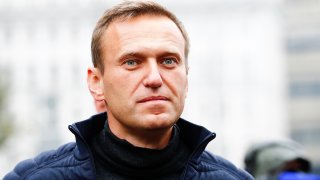
Tests conducted on Russian dissident Alexei Navalny at a German hospital indicate that he was poisoned, but doctors said Monday he was being treated with an antidote and his life was not in immediate danger.
The Charité hospital said in a statement that the team of doctors who have been examining Navalny since he was flown from Siberia and admitted Saturday have found indications of “cholinesterase inhibitors” in his system.
Chancellor Angela Merkel, who had personally offered Germany's assistance in treating Navalny before he was brought to Berlin, said in view of the findings and his "prominent role in the political opposition in Russia, authorities there are now called upon urgently to investigate this crime in detail and in full transparency.”
“Those responsible must be identified and held accountable,” Merkel said.
Cholinesterase inhibitors are a broad range of substances that are found in several drugs, but also pesticides and nerve agents. Charité said the specific substance to which Navalny was exposed is not yet known.
“The patient is being treated in intensive care and remains in medically induced coma. While his condition is serious, it is not currently life-threatening," the hospital said in a statement.
Get Tri-state area news delivered to your inbox.> Sign up for NBC New York's News Headlines newsletter.
Cholinesterase inhibitors act by blocking the breakdown of a key chemical in the body, acetycholine, that transmits signals between nerve cells.
Local
This results in overstimulation of the junction between nerves and muscles. Each year hundreds of thousands of people suffer from cholinesterase inhibitors poisoning, mostly due to exposure to pesticides.
Navalny is being treated with the antidote atropine, the hospital said.
“Alexei Navalny’s prognosis remains unclear; the possibility of long-term effects, particularly those affecting the nervous system, cannot be excluded," it said.
The hospital added that it has been in close contact with Navalny’s wife, Yulia Navalnaya, who visited her husband in the Berlin hospital on Sunday and Monday.
Navalny,a politician and corruption investigator who is one of Russian President Vladimir Putin’s fiercest critics, fell ill on a flight back to Moscow from Siberia on Thursday and was taken to a hospital in the city of Omsk after the plane made an emergency landing.
His supporters believe that tea the 44-year-old drank was laced with poison — and that the Kremlin is behind both his illness and a delay in transferring him to Germany.
German authorities posted a special detail of federal agents and city police at the hospital once Navalny arrived on Saturday out of suspicion he had been the victim of an attack.
“It was obvious that after his arrival, protective precautions had to be taken,” Merkel’s spokesman, Steffen Seibert, told reporters Monday.
Navalny’s team last week submitted a request in Russia to launch a criminal probe, but as of Monday, Russia’s Investigative Committee still has not opened a case, Navalny's spokeswoman Kira Yarmysh said.
Yarmysh pointed out that Navalny's team insisted the politician had been poisoned “from the very beginning, despite statements of the Omsk doctors and state propagandists.”
“Now our words have been confirmed by tests in independent laboratories. Navalny’s poisoning is no longer a hypothesis, it’s a fact,” Yarmysh said in a tweet.
Ilya Yashin, an opposition politician in Moscow and a close ally of Navalny, in a video statement Monday urged Russia’s law enforcement to investigate “an attempt at the life of a public figure” and to look into the possible involvement of Russian President Vladimir Putin.
“It is Putin who benefits from these endless assaults,” Yashin said.
The Kremlin has not commented on the allegation.
U.S. Ambassador to Russia John Sullivan said the Navalny case would on the agenda for Deputy Secretary of State Stephen Biegun’s visit to Russia that begins Tuesday.
“With Alexei Navalny in a hospital in Berlin, our dialogue with Russia must include reemphasizing the importance of free speech and civil society,” he told reporters.
Navalny was flown to Germany on Saturday from Siberia after much wrangling over whether he was stable enough to be transported.
Before the Charité announcement, Russian doctors said Monday that two laboratories there had found no poisonous substances in Navalny's system.
“If we had found poisoning confirmed by something, it would have been much easier for us,” said Anatoly Kalinichecnko, deputy chief doctor of the Omsk Ambulance Hospital No. 1, where Navalny was treated.
“But we received a final conclusion from two laboratories that no toxic chemicals that can be considered poisons or by-products of poisons, were found.”
The hospital's chief doctor, Alexander Murakhovsky, rejected allegations made by Navalny’s team that doctors in Omsk had been acting in coordination with Russia’s security services.
“We were treating the patient, and we saved him," Murakhovsky said. “There wasn’t and couldn’t be any influence on the patient’s treatment.”
He wasn’t able to identify men in plainclothes spotted in the hospital last week who the politician’s allies said were law enforcement and security service agents.
“I can’t say who they were,” Murakhovsky said.
Kremlin spokesman Dmitry Peskov said last week he didn’t know anything about security service operatives being present at the hospital.
Like many other opposition politicians in Russia, Navalny has been frequently detained by law enforcement and harassed by pro-Kremlin groups. In 2017, he was attacked by several men who threw antiseptic in his face, damaging an eye.
Last year, Navalny was rushed to a hospital from jail where he was serving a sentence on charges of violating protest regulations. His team also suspected poisoning then. Doctors said he had a severe allergic reaction and sent him back to detention the following day.
___
Daria Litvinova reported from Moscow. Kirsten Grieshaber and Frank Jordans in Berlin and Jim Heintz in Moscow contributed to this report.
___
This story has been corrected to show that the last name of the Omsk hospital’s chief doctor is Murakhovsky, not Murkhavsky.



